
Etruscan Phrases
Translation of Short Inscriptions (continued)
Scripts: AC, BR, AV, SC &
Mirrors: BM, DJ, DG, DD, DC, DB, DA,DE, DK, DN
by Mel Copeland
(from a work published in 1981)
General note: We shall attempt to get better and, where appropriate, more complete images of the texts. With the cooperation of curators and owners of the artifacts in supplying the desired images the understanding of Etruscan history will become more complete. The Etruscan artifacts that contain text are scattered in private and museum collections around the world and are thus very difficult to locate. It is the objective of this site to present accurate images with credits to the source of the images and the location / provenance of each artifact containing text. Until better images are received we must make do with what we have.
 Script AC - Bucchero aryballos from Cerveteri, end of the seventh century B.C., Museo di Villa Giulia, Rome (Image: "The Etruscans," Federica Borrelli and Maria Cristina Targia, The J. Paul Getty Museum, 2004). The vase has a continuous inscription filled with white paste. When we obtain an image of the rest of the vase this will change:
Script AC - Bucchero aryballos from Cerveteri, end of the seventh century B.C., Museo di Villa Giulia, Rome (Image: "The Etruscans," Federica Borrelli and Maria Cristina Targia, The J. Paul Getty Museum, 2004). The vase has a continuous inscription filled with white paste. When we obtain an image of the rest of the vase this will change:
AC-1 ...H: AR FAS A APHANV (AØANV E.....[Translation: ..H: the altar (L. ara-ae) divine command, law, destiny (L. fas) in (L. a) unneasiness, sorrow (It. affanno, m.) E.....]
AC-5 ..L CHV ( ![]() V) FAIS ERATV RA... [Translation .. whereby (L quo; It. per cui; Fr. par quoi) the dregs or lees of liquid, especially of wine (L. faex, faecis., f.) Erato, the Muse of lyric and love poetry (L. Erato) ra...]
V) FAIS ERATV RA... [Translation .. whereby (L quo; It. per cui; Fr. par quoi) the dregs or lees of liquid, especially of wine (L. faex, faecis., f.) Erato, the Muse of lyric and love poetry (L. Erato) ra...]
AC-9 ..IL TALI PILEKA TVRAN I....[Translation: his or the design, loom (L. tela-ae) of the mistress (L. paelex [peliex]-icis, mistress, concubine) Turan (L. Venus, Gr. Aphrodite)
AC-14..V FE FEL VSINAS ECH (E![]() E) ...[Translation: ...I sail (L. veho, vehere) of the great (Etr. Vel) Osinas ; owl, raven, crow. a bird from whose note auguries were taken (L. oscen-inis) behold!...]
E) ...[Translation: ...I sail (L. veho, vehere) of the great (Etr. Vel) Osinas ; owl, raven, crow. a bird from whose note auguries were taken (L. oscen-inis) behold!...]
Script SC, Shard from Cetamura del Chianti (Image: fsu.edu/~classics/cetamura)
 SC-1 LAVS INI...[Translation: praise (L. laus, laudis; to praise, L. laudo-are) ini...] Note: LAVS is used in the Tabula_Cortonensis.html at TC213 in the following context:
SC-1 LAVS INI...[Translation: praise (L. laus, laudis; to praise, L. laudo-are) ini...] Note: LAVS is used in the Tabula_Cortonensis.html at TC213 in the following context:
TC213 RINA
LAVS IS A [Translation: the queen (L. regina,; It. reginna, f.; Fr. reine, f.); praise (L laus, laudis; to praise, L. laudo-are) and that to (L. is, ea, id; she, it; with et-que, etc., and that too, and what is more) to (l. a);
TC220 SILAR MEK LeRASNA L_ _ _RIS
[Translation: be silent (L. sileo-ere-ui) to me (It. mecco) there (le, la) the Etruscans (Etr. RASNA, RASNE)....]
Script BR, bucchero plate from Rome, found at the foot of the Capitol, together with other Etruscan pottery from the Palatine and Forum Boarium (Image: "The Etruscans," Massimo Pall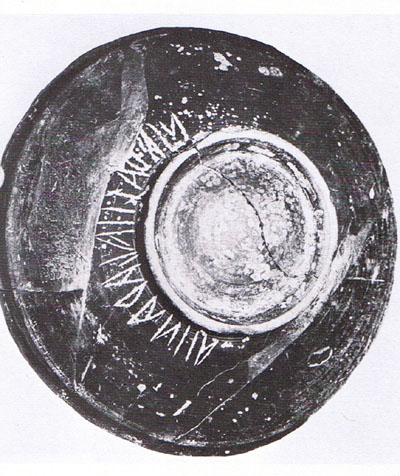 ottino, 1975, from St. Etr., XXXIII, M. Pallottino 1965)
ottino, 1975, from St. Etr., XXXIII, M. Pallottino 1965)
BR-1 NIA RASIIA LAR ANIIA [Translation: indeed, truly (L. nai, ne, nae) or alternatively, new (L. novus-a-um; Gr. nous, nea) of the tribe, race (L. tribus-us; It. razza; Etr. Rasna, Rasne) of the god (L. lar, laris) of the Anio? (L. Anio-enis)]
Note: RASIIA and ANIIA are unusual constructions. The suffix "ia" sets these words apart as proper names.
Script AV — Votive bronze of Apollo.
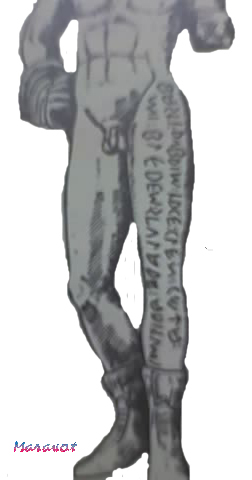
AV-1 8ASTI: ROBRIS (RV8RIS): TRCE: CLEN: CEKA: [Translation: fasti, list of legal days (L. fasti-orum) of the oaks (L. rubor-oris; Fr. rouvre, oak) Trce? of the clan? whatever (L. quacumque; It. checche; Fr. quelque)
AV-6 MI: 8LERES: SPULARE (SPVLARE): ARITISI [Translation: mine (L. meus-a-um; It. mi, myself) of Faleerri?
Script BM, Mirror of "Heracles and Atlas." Source unknown.

BM-1 ATHLE (ALE or ADLE) [Translation: Atlas]
BM-2 CRVTHAI (CRVAI or CRVDAI) CE [Translation: cruel / cruelty ( L. crudelis-e, adj. crudelitas-atis, f.; It. cudele, adj., crudeita, f.; Fr. crauté, f.) to us (It. ce)] Note: It is interesting that this mirror does not have the name Heracles (Etr. HERCLE) though it contains the name of Atlas, probably written with the thita:
. The similar character in CRVTHAI is also probably the thita; however it does appear to be the character "D" which would normally be read as an "R." The letter "d" is rare in Etruscan scripts. To confirm the actual character used we need a good image of the original mirror.
If the character is an "R" the word may relate to L. cruor,-oris, "bloodshed, gore, slaughter," but the context of cruelty seems to best apply, since Atlas had a cruel labor of holding up the earth. Heracles found the Titan Atlas holding up the earth in northwestern Africa, where a great range of mountains bearing his name appears today.
Heracles was sent by Eurystheus for the golden apples and Atlas's brother, Prometheus — whom Heracles had just rescued from his torment by the jealous gods — advised that Atlas could fetch them for him. Heracles took the advise and offered to hold up the earth while Atlas went for the golden apples. Atlas returned with the apples but offered to deliver them directly to Eurystheus, intending to leave Heracles with the labor. Heracles agreed but cleverly asked Atlas to hold the earth for just a moment while he put a pad on his head. Once free of the burden, Heracles strode away with the apples, leaving Atlas worse off than he was before.
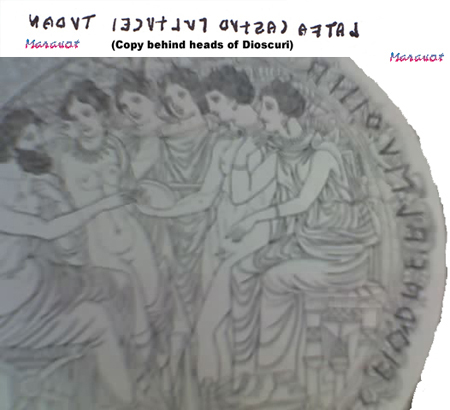
Script DA
DA-1 LATFA CASTVR PVLTVCEI TVRAN [Translation: Leda, Castor, Pollux or Polydeukes, Turan] LATFA – See also CM-1. Note the "ei" suffix in Pollux's name. This suffix is common to Helen of Troy's name, ELINEI in Script MM.
DA-5 TVNTLE [Translation: Tyndareüs] TVNTLE – See also CM-2.
DA-6 THEI (EI) THRVNEI (
RVNEI) ALSV RINA [Translation: goddess (L. deus, divus, di, divi, dea, diva; It. dio, dia; Fr. dieu, dieux, deese) of the Trojans (L. Troianus-a-um) the cold (L. alsius-a-um) queen (L. regina-ae; It. regina; Fr. reine)] Note: ALSV must be a verb, infinitive.
This scene shows Queen Leda and King Tyndareüs being presented the egg containing Helen by Castor and his brother Pollux, with Turan and another woman observing.
There are six characters in the scene, one of which must be a goddess (besides Turan). Turan is probably the female next to Tyndareüs, which coincides with the order in the list. Next to Turan must be the other goddess: the Trojan goddess. Next to her would be Castor and next to him Pollux. The seated woman who appears somewhat bored or pensive must be Leda.
According to popular versions of the story it was shepherds who found the egg laid by Nemesis that contained Helen and who presented the egg to Leda. In this story Castor is presenting the egg to Tyndareüs.
 Script DB
Script DB
DB-1 ATLENTA MELIAPHR (MELIAØR) [Translation: Atalante, Meleager]
DB-3 ATHRPA (ARPA) [Translation: Atropos]
Atalanta (or Atalante) was a virgin huntress, daughter of either Iasus, king of Tegea, or Maenalus, by Clymene, daughter of Minyas. Her father could also have been Schoeneus, a son of Athamas. Wanting only sons, Atalanta's father exposed his infant daughter in a forest, but she was suckled by a bear and eventually found by hunters who brought her up. Atalanta grew to adulthood loving the hunt above all other things and wished to remain a virgin in oarder that she might continue to enjoy the sport. Some say that an oracle warned that disaster would result if she married.
She participated in the Calydonian Boar Hunt together with some of the most famous men of her age. Her participation led to the death of some of the men, including the sons of Thestius and perhaps also of Meleager, who had falled in love with Atalanta.
Meleager was a son of Oeneus, king of Calydon, and Althaea, daughter of Thestius. Immediately after the birth of the infant Meleager, the three Fates appeared in the mother's room. Clotho and Lachesis predicted that the child would be noble and brave, but Atropos, pointing to a stick burning in the fireplace, added that he would die the moment the brand was consumed. Althaea leaped from her bed, put out the flames, and hid the stick somewhere in the palace.
Meleager went with Jason and the Argonauts when he was a youth, and his uncle, Laocoön, went along with him to keep an eye on him. Diodorus Siculus claims that Meleager was the one who killed the Argonauts' chief enemy, Aeëtes, king of Colchis. Later Meleager was called to participate in the Calydonian Boar Hunt.
The hunt made both Meleager and Atalanta famous and Atalanta eventually became reunited with the father who thought to abandon her. He suggested that she ought to marry, but Atalanta declared that she preferred to remain unattached. To avoid any problems she devised a contest, where a prospective candidate would have to run a footrace with her. If he won, Atalanta would be his. If he did not, however, he would be instantly killed and his head would adorn one of the poles set up about the stadium.
The suitors were given every chance to catch the fastest runner of the day, and she was also considered to be one of the most beautiful of women. They ran naked, whereas Atalanta was encumbered with armor and, according to some accounts, she ran twice as far. Some say that she also carried a sword in the race and when she caught up with a runner she would instantly dispatch him there on the spot.
There are two versions to the Calydonian Bear Hunt story, one of which has Meleager killing the boar but dying himself, along with others. In another version Meleager survives the hunt but gets involved in a quarrel over the prize, between the Calydonians and their traditionally hostile neighbors, the Curetes. In the war that ensued, the Calydonian forces repulsed the enemy as long as Meleager led them. But when Meleager killed some of Thestius' sons, his mother's brothers, Althaea cursed him. Angry at this, the young man refused to fight further. The Curetes stormed the walls of Calydon, but Meleager ignored the appeals of his mother and father. Finally Cleopatra begged him to forget his anger for the sake of the city. Meleager relented and repelled the charge at the head of the Calydonian forces. All writers but Homer who follow this version add that Meleager died in the fighting. Ovid (Metamorphosis) tells of another version who says that Meleager gave the boarskin to Atalanta. Thestius' sons took it from her and Meleager killed them. Althaea, beside herself with rage at her sons's murder of her brothers, remembered the brand that the Fates had said was the key to Meleager's life. She took it from its hiding place and flung it into the fire. Meleager died in agony. Althaea killed herself in remorse, while Cleopatra died in grief and other women mourned so much that Artemis — who had a grudge against the house of Oeneus — turned them into guinea fowl (meleagrides).
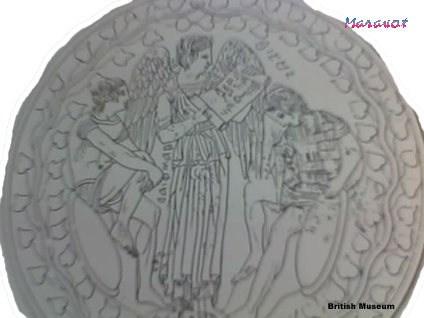
Script DC (Mirror in British Museum)
DC-1 AIFAS [Translation: Ajax (L. Aiax-acis; Gr. Named after eagle, aietos)
DC-2 LASA AIFAS HAMPHIAR (HAMØIAR) [Translation: Lasa, household goddess (L. Lasa), Ajax, Amphiaraüs, an Argive warrior and seer.]
DC-5 HAMPHIAR (HAMØIAR) [Translation: In this scene we have the goddess presenting a document that carries all three names. Ajax had gotten into a dispute over who should be worthy to take the dead Achilles' armor, and having become desolated over not winning it he committed suicide. Amphiaraus, a son of Oicles and Hypermnestra and a descendant of Melampus, was the great diviner of his day. Loved by both Zeus and Apollo, he received his second sight from Zeus. Amphiaraus hunted the Calydonian boar and, some say, was second only after Atalanta in shooting it. He drove Adrastus from the Argive throne, but the quarrel was patched up. He married Adrastus' sister Eriphyle and agtreed that she should thereafter act as arbiter between himself and Adrastus, each agreeing to abide by her decisions.
When Oedipus died, Amphiaraus helped to officiate at his funeral and was much admired by the Theban women. Later, knowing that only Adrastus would survive the campaign of the Seven Against Thebes, he at first refused to join it, but Eriphyle, bribed by Polyneices, forced him to go. Amphiaraüs made his sons, Alcmeon and Amphilochus vow to avenge him.
This scene involving Ajax is unusual, but consistent with other Etruscan mirrors involving heroes in scenes which the Greeks and Romans did not describe. While we know that Ajax committed suicide because he was not awarded the armor of the dead Achilles, it is not clear what Amphiaraus has to do with the scene involving Ajax's remorse.
Script DD (Image from A. J. Pffifig, "Die Etruskiche Sprache, Graz. 1969)
DD-1 AULE  (AFLE) FIPINAS [Translation: Aule, Lord, prince (L. aule, princely courts) Fipinas, Virbius, a minor Italian god. He is also known as Hippolytus, who was the son of Theseus and his mistress the Amazon queen Antiope, or Hippolyte. When Theseus, king of Athens, was about to marry Phaedra, daughter of Minos, he sent Hippolytus to Troezen, intending that he should eventually succeed to the rule of that city, where Pittheus, Theseus' aged grandfather, was king. Later, Theseus was himself exiled for a year from Athens and went with his wife to Troezen. Phaedra fell in love with Hippolytus, but he, a follower of the chaste goddess Artemis, spurned her love. She hanged herself, leaving a note for her husband which accused Hippolytus of having raped her. Theseus not only banished his son but called down on his head one of three curses that Poseidon had once granted him. A bull raging out of the sea frightened Hippolytus' horses and he was dragged to his death. Too late, Theseus learned the truth from Artemis.
(AFLE) FIPINAS [Translation: Aule, Lord, prince (L. aule, princely courts) Fipinas, Virbius, a minor Italian god. He is also known as Hippolytus, who was the son of Theseus and his mistress the Amazon queen Antiope, or Hippolyte. When Theseus, king of Athens, was about to marry Phaedra, daughter of Minos, he sent Hippolytus to Troezen, intending that he should eventually succeed to the rule of that city, where Pittheus, Theseus' aged grandfather, was king. Later, Theseus was himself exiled for a year from Athens and went with his wife to Troezen. Phaedra fell in love with Hippolytus, but he, a follower of the chaste goddess Artemis, spurned her love. She hanged herself, leaving a note for her husband which accused Hippolytus of having raped her. Theseus not only banished his son but called down on his head one of three curses that Poseidon had once granted him. A bull raging out of the sea frightened Hippolytus' horses and he was dragged to his death. Too late, Theseus learned the truth from Artemis.
According to some writers, Hippolytus was revived by Asclepius. Refusing to forgive his father, he went to Aricia, in Italy, where he became king and instituted rites in honor of Artemis (Diana). He was later honored there as the minor diety Virbius. At Troezen girls cut off their hair before marrying and dedicated it to Hippolytus. He also had a hero shrine at Sparta. The Troezenians declared that hippolytus was transported to the sky as the constellation Auriga, the Charioteer.
DD-3 CAILE FIPINAS [Translation: heavenly? (L. caeles-itis) or Caelius-a-um, name of a Roman plebeian gens. Fipinas (Virbius, Hippolytus)]
DD-5 CACO (CACV) [Translation: Cacus, son of Vulcan? Cacus was a fire-breathing giant who stole the cattle of Geryon that Heracles was leading home through Italy. He dragged them by the tails to his cave at Rome so that their owner could not follow their trail. Heracles would not have found the missing cattle if one of them had not lowed from Cacus' cave as Heracles' herd was passing by. Heracles killed the giant and was thereafter honored as a hero by the people of the region.] Note: Vipinas is a name recorded as a Celtic name.

Script DE "Turan and Adonis"
DE-1 FALE [Translation: you deceive, lead astray (L. fallo, fallere)] Note: Z614-629 contain a repeated verse, FILE FALE "the daughter you deceive."
DE-2 TITE CALE: ATIA Le: TVRCE [Translation: the tribe (L. Tities-ium, one of the three original tribes at Rome) you call Attys (Attis, King Atys, father) there (le, la); Turce, name? See HA-2 for Trce, written on a bronze haruspex, and AN-5, BS-7, for ATIA.
DE-7 MALuS TRIA: CEER [Translation: the evil, malice (L. malus-a-um) of the three (L. tres, tria) of Caere? (L. Caere, Caeres-itis)]
This mirror has been attributed to Turan (Aphrodite) and Adonis. Adonis was said in the Catalogue of Women to be the son of Phoenix and Alphesiboea, but Apollodorus called him a son of Cinyras, king of Paphos, Cyprus, by his wife, Metharme, daughter of Pygmalion. A more usual tradition makes him the son of an incestuous union of Cinyras or Theias, king of Assyria, with his daughter, named Myrrha or Smyrna. For not giving honor to Aphrodite, the girl was punished by the goddess with an uncontrollable love for her father. Myrrha satisfied her desire with the help of her nurse and became pregnant. When the father learned what had happened, he pursued the girl with a sword. The gods changed him into a myrrh tree, which split open in due course, revealing the infant Adonis inside.
According to one version of the story, Aphrodite, on seeing that the child was beautiful, put him secretly into a chest and entrusted him to Persephone's keeping. Persephone looked into the chest and, finding the boy as attractive as Aphrodite did, refused to give him up. Aphrodite went to Zeus over the matter and he decreed that Adonis should spend one third of the year with each goddess, keeping the remaining third for himself. The muse, Calliope, may have been involved in the judgment. Aphrodite was infuriated at the proposal and caused the death of Calliope's son Orpheus.
Adonis enjoyed hunting and was at an early age killed by a boar. Aphrodite had warned him to confine his hunting to small game, but he didn't listen to her. In another version of the story Aphrodite fell in love with the boy and spent much of her time with him. Adonis preferred to hunt and lost his life hunting a boar.
This mirror mentions Atia, who may be Attis, a god who was similar in nature to Adonis. He was born from the genitals of the Phrygian mother-goddess Cybele. She was often worshipped as the mother of the gods, like Rhea. According to one story Zeus ejaculated on the ground while sleeping on Mount Dindymus. There grew up on the spot a strange creature with both male and female organs. To prevent the creature from reaching an adult size the other gods cut off its male genitals. The castrated creature grew to be the goddess Agdistis or Cybele.
From the severed genitals grew an almond tree. One day Nana, daughter of the river-god Sangarius, placed one of the fruits of this tree in her lap. It vanished and Nana found herself pregnant. In time she gave birth to a boy, whom she exposed. This child, Attis, ws somehow suckled by a he-goat and grew up to be a handsome young man. Agdistis saw him one day and fell in love with him, but the youth, apparently unaware of this fact, prepared to marry a daughter of the king of Pessinus, a city at the foot of Dindymus. Madly jealous, Agdistis drove both Attis and the king mad. They castrated themselves in their frenzy and Attis died. Agdistis, regretting her fury too late, asked Zeus to grant that Attis' corpse never decay. He was buried at Pessinus, below a rocky outcrop called Agdus. Some say that Attis was transformed into the evergreen pine which became sacred to him.
Note: If the translation is correct, the reference to the "evil three" is not clear, as the story involves Persephone's and Aphrodite's (Turan's) love for Adonis.

Script DF "Orestes and Clytemnestra," Veii, Fourth Century B.C.
DF-1 CLUTHUMUSTHA (CLVVMVSUMUS
A) [Translation: Clytemnestra, wife of King Agamennon]
DF-2 OROSTHE (VRVSE) [Translation: Orestes, son of King Agamemnon and Queen Clytemnestra, parents of Orestes.]
DF-3 NATHOM (NAVM) [Translation: sailor? (L. nauticus-a-um)
DF-4 AEITHEON (AEIEON) [Translation: Jason]
Clytemnestra was the daughter of Tyndareus, king of Sparta, and Leda and was the sister of Helen of Troy. Tyndareus married Clytemnestra to Tantalus, son of Thyestes. Agamemnon, king of Mycenae, killed her husband and her baby, whereupon Tyndareüs gave her to him in marriage. She bore several children to Agamemnon: Iphigeneia, Electra (Laodice), Chrysothemis, and Orestes. Agamemnon deceived her into sending Iphigeneia to Aulis, on the pretext of marrying her to Achilles; in reality he was preparing to sacrifice her to Artemis (Agamemnon had offended Artemis by boasting that he was a better archer than she, so she asked him to sacrifice his beloved daughter to make things right).
When Clytemnestra discoverd this treachery she conceived a great hatred for her husband and plotted with her lover, Aegisthus, to kill him on his return from the Trojan War. When Agamemnon returned, accompanied with his new concubine, Cassandra, daughter of King Priam, the two lovers killed him in his bath and Clytemnestra, herself, is reported to have killed Cassandra. Aegisthus and Clytemnestra had two children, Erigone and Aletees.
Orestes had been sent away as a child to Phocis by his sister Electra. There he was raised by Strophius, who had married Agamemnon's sister, Anaxibia or Astyoche. Orestes and Strophius' son, Pylades, became loyal friends, and Pylades accompanied Orestes in nearly all his subsequent adventures. Eight years after his escape from Argos, Orestes, now a young man, went to Delphi to ask of the oracle what it was his duty to do about his father's murderers, who were prospering in Agamemnon's palace. Apollo commanded him to kill them both. With many misgivings Orestes journeyed to Argos with Pylades and there made himself known to Electra, whom Aegisthus had married to a commoner or otherwise humiliated. Urged on by Electra, Orestes killed Clytemnestra and her lover.
In spite of its divine sanction, this deed led the Erinyes of Orestes' mother to drive him mad. Moreover, he was brought to trial by Clytemnestra's father, Tyndareus and one of her relatives, Oeax, urged his banishment. Orestes wandered to Delphi to seek help from the oracle on his madness. Apollo told him to go to the land of the Taurians to steal the wooden statue of Artemis that had fallen there from heaven. If he brought it to Attica it would restore his health.
The Taurians — who were a tribe of Scythians — had a practice of sacrificing all of the strangers that visit their land, and Iphigeneia was the priestess of the Temple of Artemis. When Orestes and his friend, Pylades, stepped foot on the Taurian soil they were instantly captured and dragged to the temple to be sacrificed. Iphigeneia recognized them and arranged for their escape, with Athena's help. On his return, Orestes became king of Mycenae and as a decendent of Tyndareus he succeeded to the throne of Sparta when Menelaüs died, being the king of both cities became the most powerful monarch in the Peloponnesus. Pylades married Orestes' sister, Electra, who bore him two sons, Medon and Strophius.
In this mirror we see beneath the floor of the murder scene Jason of the Argonauts who killed a dragon guarding the Golden Fleece in Colchis. Jason's story begins with the murder of his father by Pelias, king of Iolcus. Pelias and his twin, Neleus, had been exposed at birth and a horse herder accidentally discovered them, but a mare had trampled on Pelias' face, leaving a livid mark (pelios). When grown, Pelias revealed his violent nature by killing the stepmother of his mother, who was Tyro, daughter of Salmoneus and the god Poseidon. She had mistreated Tyro as a child, accounting for the reason Tyro abandoned Pelias and his twin. Pelias then began to persecute his brother Neleus and their half-brother Aeson. When Neleus put in a claim to the throne, Pelias turned on his twin and drove him out of the country. Aeson's wife bore a son, but it was mourned as dead at birth, so Pelias felt no alarm. Pelias became one of the most powerful Greek kings of his day, but a prediction by the Delphic oracle came to his attention, that an Aeolid wearing one sandal would one day bring about his death.
The prophesy came true the day Jason returned to claim the throne of Iolcus. In crossing a stream on the way to the city he lost a sandal, and went on without it. The king was not present in the city when Jason entered it, but an official of the city heard the young man who was missing a sandal declaring his right to the throne, and he reported his sighting to King Pelias. Pelias recognized the boy and tricked him into going to Colchis to recover the Golden Fleece — which Pelias believed would be Jason's last voyage. While Jason was gone on his adventure with the Argonauts Pelias killed Jason's father, Aeson, and his brother Promachus, a mere boy. Aeson's wife committed suicide.
Pelias had from an early date offended Hera, in refusing to sacrifice to her, so Hera had taken sides with Jason, greeting him at the stream where he lost his sandal, and she contrived a complex plan of revenge against Pelias: to cause Jason to abduct the sorceress, Medea, who was the daughter of the king of Colchis where the Golden Fleece was kept. Hera caused Medea to fall in love with Jason, and Medea continued to be the main help for Jason, to kill the dragon that guarded the Golden Fleece and to deliver the poison that would take Pelias' life. After Pelias was killed Jason and Medea took the throne of Iolcus and then went to Corinth to claim the throne there that had been in Medea's inheritance (Her father, Aeëtes, had been king of Corinth before he took the throne of Colchis). Their presence in Corinth was not well received by the Corinthians, however, because they believed the powerful sorceress would stop at nothing to gain her ends. She was beginning to become an embarrassment to him and finally Jason divorced her and took the hand of Creon's daughter, Glauce or Creüsa. Threatened with banishment as well as divorce, Medea reminded Jason that all the exploits for which he was famous would never have been accomplished without her help. There are several differing accounts as to what happened to Medea and her two sons by Jason, Mermerus and Pheres, after the divorce.
When the artist-story-teller of the mirror placed Jason in the bottom panel of the scene, beneath the panel describing Orestes' revenge for his father's death, it may be as an allusion to the revenge Jason took upon Pelias, his father's murderer. As one can see, both stories, which we sumarize here, are quite complex, and this is a testimony to the Etruscan artisan's extraordinary story-telling abilities. Another mirror like it is the Divine_Mirror.html, Script DM.
The character in the scene who is named NATHVM, who brandishes snakes in his hands, must be Pylades.
 Script DG -- mirror, "Perseus and Medusa."
Script DG -- mirror, "Perseus and Medusa."
DG-1 PHERSE (ØERSE) [Translation: Perseus]
DG-2 METVS [Translation: Medusa]
DG-3 MENRFA [Translation: Minerva]
Medusa was one of the three snaky-haired monsters known as the Gorgons. Medusa, unlike her sisters, Stheno and Euryale, was not immortal. In late versions of the myth, she is said to have once been a beautiful maiden. Pursued by many suitors she would have none of them, until Poseidon lay with her in a flowery field. She incurred the enmity of Athena, either because the goddess envied her beauty or because Medusa had yielded to Poseidon in Athena's shrine. In any case, the goddess turned Medusa's lovely hair into serpents and made her face so hideous that a glimpse of it would turn men to stone. Not content with this, Athena helped Perseus to behead Medusa, and he later gave her the head to wear in the center of her aegis. The drops of blood that fell from Medusa's severed head into the Libyan Desert were transformed into snakes, one of which later killed Mopsus, the Argonautic seer. The goddess also cut off a lock of Medusa's hair and gave it, concealed in an urn, to Heracles. He later gave it to Sterope, daughter of King Cepheus of Tegea, explaining that she could repel an enemy host merely by holding it up before them. From Medusa's neck sprang the warrior Chrysaor and the winged horse Pegasus, her children by Poseidon.
Perseus was a king of Mycenae and Tiryns. His mother, Danaë, bore him in a brazen cell in which her father, Acrisious, king of Argos, had imprisoned her on learning from an oracle that a son of Danaë would kill him. Although Danaë claimed that Perseus was a son of Zeus, who had visited her as a shower of gold, Acrisius set mother and child adrift in a chest. (This compares to an Egyptian story involving the god Osiris and his wife, Isis. Osiris' brother, Set, was jealous of Osiris and talked him into laying in a coffin to see if it would fit him. When Osiris did it, Set nailed the lid shut and set it adrift, where it came to rest on a beach near Tyre, Lebanon.)
Zeus saw to it that the chest containing Perseus floated safely across the sea to the island of Seriphus, where it was found by a kindly fisherman, Dictys, who took them in and raised the youth to adulthood. One day King Polydectes, Dictys' lustful brother, saw Danaë and wanted to marry her, but she was unwilling and the king did not dare to oppose Perseus, who defended his mother's decision. He therefore falsely announced that he intended to sue for the hand of Hippodameia, daughter of the Pisan king Oenomaus, and required all of his subjects to contribute horses toward the bride-gift. Perseus, who owned no horses, rashly promised to bring anything else that the king might ask, even to the head of the Gorgon Medusa. Polydectes eagerly accepted this offer, knowing that no man had ever returned alive from an encounter with the Gorgons. The Gorgons were an invincible foe for an ordinary mortal: on foot he could not get near them; to esacpe after battle would be impossible, for they would follow on golden wings. To kill Medusa one would need to attack invisibly and then flee faster than her sisters could fly. Moreover, anyone who glimpsed a Gorgon's face would instantly be turned to stone. But Perseus had the help of Athena, who had her own reasons for killing Medusa. She appeared to him and explained how to proceed against the Gorgons.
Athena told Perseus that he would have to get directions from two hags — known as the Graeae — on the whereabouts of special weapons needed to kill the Gorgons. The hags, gray-haired from birth, lived in a cave on the Libyan mountain where Atlas stood. They shared one eye between them and in order to see would pass it back and forth between them. Perseus stole the eye, and this was sufficient for them to reveal where the weapons would be found. They were a large wallet or pouch that he slung over his shoulder, a pair of winged sandals which would enable him to fly away from the Gorgons, and the cap of darkness which made him invisible as soon as he placed it on his head. Hermes brought the last weapon to Perseus, a sword or sickle of adamant. With his own bronze shield and the weapons supplied to him he flew off to find the Gorgons.
Their hair was surrounded with the petrified forms of men and animals that had looked at the Gorgons' faces. Perseus avoided this danger by keeping his eyes on the highly polished surface of his shield, in which the scene was clearly but safely reflected. Invisible, he soon found the Gorgons, hideous monsters with hands of brass and wings of gold; huge tongues lolled from their mouths between swine's tusks, and their heads were entwined with snakes. Perseus waited until they were asleep; then, avoiding the two immortal Gorgons, Stheno and Euryale, he crept toward Medusa. Watching her in his shield, he cut off her head with a single blow of the sikcle, stuffed it into the wallet, and felw off. The other Gorgons rose into the air, but, unable to pursue an invisible attacker, they returned to mourn their sister.
Having snatched away the head of Medusa, Perseus happened by Atlas who was king of the Hesperides and also was holding up the world. He also was guardian of the Golden Apples of the Hesperides and feared that Perseus might attempt to snatch them too. He had been told by the goddess Themis that a son of Zeus would attempt to steal them one day. The two began to wrestle but Perseus knew he would be no match for the Titan, so he drew the head of Medusa out of its pouch and showed it to Atlas. Atlas was instantly turned into a mountain, known today as Mount Atlas. But the prophesy of Themis did come true, since Heracles later approached Atlas and managed to steal the apples which was one of his labors. The apples were returned to Atlas, however.
| Script DH – mirror, "Tinia and Minerva." (right hand image shows detail) |
|||||||||||
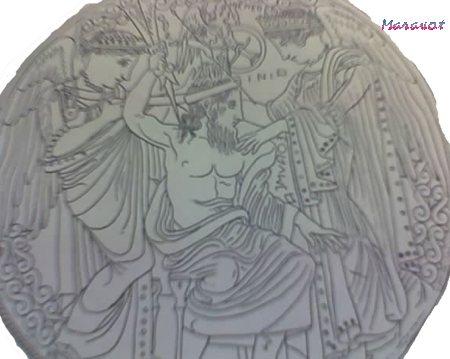 |
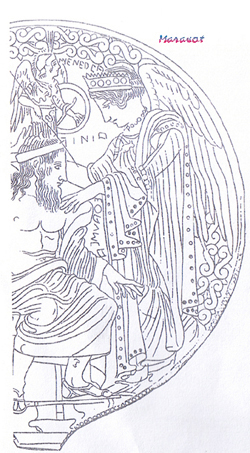 |
||||||||||
DH-1 TINIA [Translation: Tinia, supreme god (Gr. Zeus)] DH-2 MENERFA [Translation: Minerva (Gr. Athena)] DH-3 ERA OSCA [Translation: mistress (L. era] of the birds of augury (L. oscen-inis) Athena, goddess of crafts and war, was born from the first wife of Zeus, Metis. Fearing a prophesy that his son would overpower him (Zeus had overthrown his own father) Zeus swallowed the pregnant Metis, but began to repent it and asked either the Titan Prometheus or craftsman-god Hephaestus to extricate him from the predicament. One or the other took an axe and split open his head and out jumped Athena, dressed in full armor. In this mirror we can see Minerva (Gr. Athena) coming out of the head of Tinia (Gr. Zeus). A goddess, Era Osca, who wears a tiara, assists the birth with another goddess in attendance behind Tinia. Era Osca is probably the name of the goddess, but an alternative reading could be she gives (L. edo-are) the bird of augury. See also OSINAS, Script AC-17. This text confirms three words: ERA (mistress), OSCA (bird of prophecy/owl), plural OSINAS. |
|||||||||||
| Minerva was regularly represented in art, even from early times, as a tall, stately woman wearing a crested helmet and often carrying spear and shield. Her bird was the owl and she was sometimes depicted — for example, in the huge statue of Athena Promachus that stood on the Acropolis — accompanied by a snake. | |||||||||||
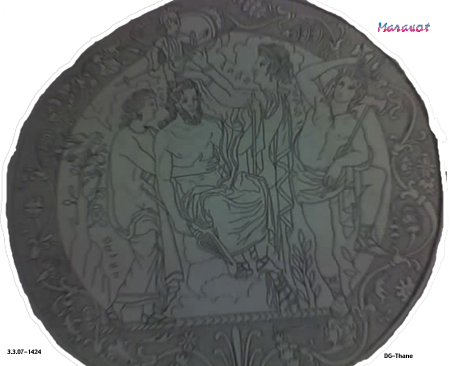 |
Script DK, "Thane." DK-1 MENRFA (Minerva) DK-2 THANE or RANE [Sc. Thane; OE. Thane, feudal lord] DK-3 TINIA [Tinia, Gr. Zeus, L. Jupiter] DK-4 THALNA or RALNA [Nemesis, mother of Helen of Troy, goddess of retribution; re: Gr. thalassinos, of the sea] Note: RHamnusia is another name for Nemesis, after he chief cult center was at Rhamnus, a town on the northeastern coast of Attica. In this mirror Ralna is embracing Tinia, showing a union between her and Tinia, the supreme god. Minerva is crowning Tinia, the father of gods. This mirror is important since the word, DK-2, rane, has to do with the event pictured. Rane declines and may, in fact, be the Etruscan equivalent of "thane" or related to the word. We know that the word RENA, RENE, etc. is to rule (L. regno-are; rego, regere; It. reggere; Fr. regler; Sanscrit, raj) and queen is RINA (L. regina-ae; It. regina; Fr. reine) king is ROI (L. rex, regis; It. re; Fr. roi; royaume, kindgom) and kingdom, reign, is RINE, RINES, RINO (L. regius-a-um; It. regno, kingdom; Fr. reign, reign). |
||||||||||
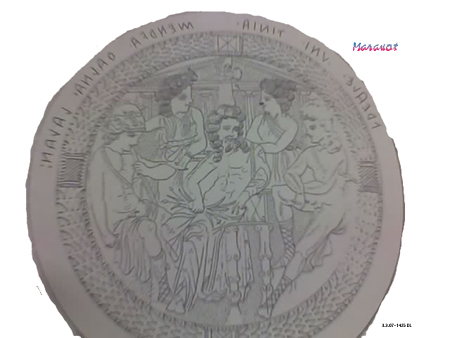 |
Script DN, "Preale." DN-1 PREALE or PRE ALE [Translation: before (L. prae, adv. before, in front) Alia, Latium? (L. Allia, Alia-ae, river in Latium). As an alternative ALE may be "you nourish," (L. alo, alere, to nourish, support, rear, feed). DN-2 VNI [Uni, goddess, consort of Tinia, L. Juno] DN-3 TINIA [Tinia, father of the gods, Gr. Zeus, L. Jupiter] DN-4 MENRFA [Minerva] DN-5 RALNA or THALNA [Nemesis, mother of Helen of Troy, goddess of retribution; re: Gr. thalassinos, of the sea] DN-6 LAVAN or LALAN? [Translation: they bathe, anoint? (L. lavo, lavare)] This text contains 6 words and five characters, four of whom are Uni, Tinia, Minerva and Ralna. PRE ALE involves two words found in other Etruscan texts: PRE (L. adv. before, prae) and to nourish (L. alo, alere). ALE appears in two other places: Z622, Au49. In script Z the context is: CIS ALE MALE [in what manner (L. qui, quibus) you nourish (L. alo, alere, alui, altum, for alitum)] Au49 is used in the context of ITALE (Italy, Italians, L. Itali-orum and -um, the Italians; Italia-ae, Italy). LAVAN or LATAN appears to be the verb, to anoint, or to bathe (L. lavo, lavare); i.e., "they anoint." |
||||||||||
Texts only (images to come):
Script DJ — The arm of a bronze statue in the Vatican Museum. The forearm is missing, leaving a fragment on the upper arm. It is believed that the statue is of the Etruscan god Tages (whose name is mentioned in the scripts). To view the statue click on Tages (sorry the link is dead; if I can find the image I will restore it).
Top line: PAS FENVS A: "Peace we bring to"
Second line: IRIS TeCFISNeS V: (L. viso, 'to see after'; Tego, ' to bury/shield/protect'; IRIS, a female messenger of the gods; Fr. iras, 'you shall go'); thus: "you shall go to protect. They look/see after Oh!"
Third line: Ce FEDeR FER (L. veter, 'to forbid'; L. vere, adv. 'truly, really'; thus: "whereby to truly forbid."
Fourth line: _ _ _ IN
Notes:
*From Edward Tripp, The Meridian Handbook of Classical Mythology, 1970.
—Θ
Launched 11.20.06
Upadated: 11.30.06; 12.01.06; 12.04.06; 12.05.06; 2.16.07; 2.23.07; 3.04.07; 3.10.07; 3.11.07; 4.30.07; 5.30.09
Copyright © 1981-2009 Maravot. All rights reserved.
Copyright © 1981-2009 Mel Copeland. All rights reserved.